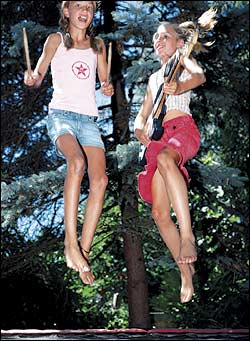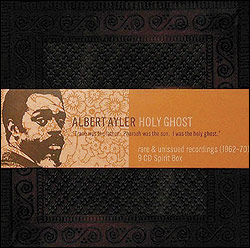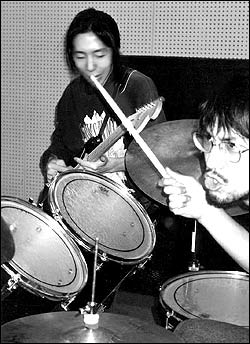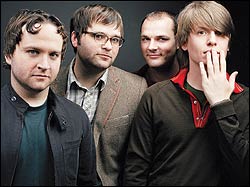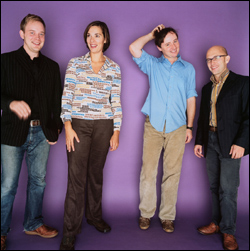Both bluegrass singer/fiddler Alison Krauss and polka stalwarts Jimmy Sturr & His Orchestra have won loads of Grammy Awards. Sadly, though, there’s no Grammy category for “Best Performance Against the Odds”—Krauss would make the ballot for sure on the strength of her version of “Dream Lover.” It appears on Sturr’s Rock ‘n Polka (Rounder), a set of up-tempo, polkafied covers of ’50s and ’60s hits, with occasional guest stars. By the liner notes’ admission, Sturr was pressured into making the album by his label, and it does seem like a dodgy idea most of the time: Willie Nelson phones in three songs; Blue Highway massacres, or rather is massacred by, the Beach Boys’ “Fun, Fun, Fun”; let’s please not discuss Lee Greenwood.
Krauss, though, turns a potential train wreck into a small gem. She’s a bit of a rocker wanna-be, which is a good thing in a bluegrass star, but her idea of rock tends to be more on the Bread–AC/DC continuum than the likes of “Dream Lover,” a 1959 hit for Bobby Darin. And the arrangement Sturr’s group presents her with is impossible: just under two minutes long, way too zippy, with an excessively perky faux-mariachi horn section that seems to have wandered over from Johnny Cash’s “Ring of Fire” and a peculiar key change a split second before she’s supposed to start singing.
It’s not the most congenial setting for Krauss, whose particular gift is for singing slow, pretty songs. Her stroke of genius is treating this caffeinated “Dream Lover” as a very fast slow, pretty song: a gradual seduction that she’s forced by circumstances to get through at top speed. The end of every verse of “Dream Lover” goes, “I want a boy to call my own/I want a dream lover so I don’t have to dream alone.” Krauss breathes audibly after the second and fourth words, putting a slightly different emphasis on each phrase, suggesting that she’s being coy about it, or pretending to be coy. “I want”—unfocused desire—”a boy”—very focused desire, she knows which boy—”to call”—teasing the “L” out and looping it into “my own I want a dream lover”: no pause there, just blurting need.
Krauss’ “dream” has at least three notes. Holding a single note for the length of the word would give it the kind of emphasis that would make it literal; the little cascade of notes means the object of her desire has to take it as a metaphor. (Don’t try this at home unless you’ve got Krauss-caliber technique. Plenty of singers can cram fluttering melismatic runs and ornaments into brief phrases; Krauss, and not too many others, can make them sound casual and conversational.)
She’s got one more phrase left in the refrain, to seal the deal: “So I don’t have to dream alone.” And here her phrasing has nothing to do with the way Bobby Darin sang it. The polka band is hurtling along, boom-chik boom-chik, but Krauss sings “I-don’t-have-to-dream-a-” as triplets, and without the melisma she’s draped over every practically every other word of the song. It sounds too fast, it sounds too slow; it steps out of the plane of the melody just a bit—the point she’s been coming to. Finally, that “-lone” gets one extra note, like a flip of the hair or a wink. You’re not going anywhere, are you?
The first thing I noticed at this spring’s Sasquatch! Festival, after Cat Power’s Chan Marshall waved her band off the stage near the end of her set, was that she had started rapping along with a recording. The second thing I noticed was that she wasn’t rapping, she was lip-synching, and that the voice she was lip-synching with was much younger than her own, and delivering an exhortation to be happy. The third thing I noticed was that Marshall was, in fact, happier than I’d ever seen her—literally skipping around the stage.
The song she was miming to was a live recording of “Rad,” by Smoosh, a Seattle duo who’ve just released their remarkable debut, She Like Electric (Section 25). The most obvious reason it’s remarkable is that singer/keyboardist Asya is 12 years old and drummer Chloe is 10, but that’s only tangential to the really interesting thing about it: You don’t often get a chance to hear musicians at the exact moment they’re discovering their powers.
It happens sometimes, and often with bands of young girls: the Bay Area’s Raooul (who evolved into Out Hud), London’s Skinned Teen, Portland’s Black Peppercorns. She Like Electric is the sound of a band pushing itself toward stuff it’s not even physically capable of yet, figuring out the kinds of songs it can invent. (They rap on a few tracks, including a new version of “Rad,” but the album mostly leans in a Tori Amos–inspired direction.) Asya’s voice is going to change in the next few years, but in the meantime she double-tracks its high thin tone to gorgeous effect on “Take It Away”; Chloe’s drumming is already starting to lock in with Asya’s singing the way Scott Plouf played with Rebecca Gates’ voice in the Spinanes. Smoosh make me as happy as they think I should be, and I can’t wait to hear what they do next.
